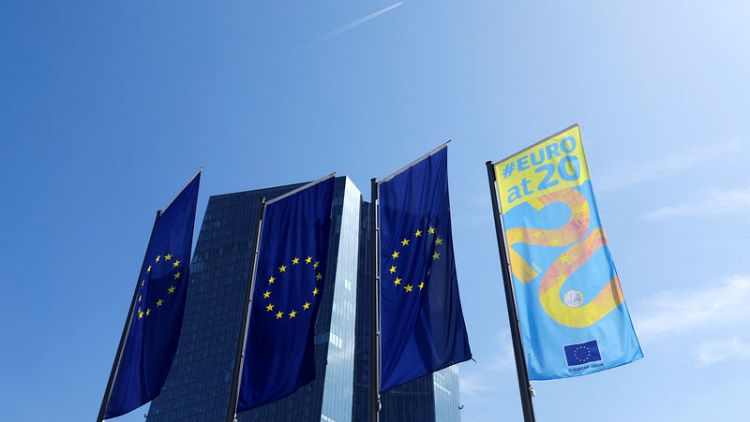By Philip Blenkinsop and Foo Yun Chee
BRUSSELS (Reuters) - Euro zone inflation remained low at 1.0% in August, well below the European Central Bank's target, a first estimate showed on Friday, bolstering market expectations that the bank will further ease monetary policy next month.
The European Union's statistics office said on Friday that inflation in the 19 countries sharing the euro was unchanged from the July reading, in line with expectations in a Reuters poll.
The rates of price increases in July and August are the lowest since November 2016, well below the ECB's inflation target of below, but close to, 2% despite years of unprecedented monetary stimulus through rate cuts and trillions of euros of bond purchases.
The ECB's Governing Council holds its next monetary policy meeting on Sept. 12 and has all but promised a stimulus package, with economic growth faltering amid a global trade war and Germany's manufacturing sector already in recession.
Market expectations are that it will carry out several interest rate cuts in the coming year, along with a fresh round of bond purchases, commonly known as quantitative easing.
The ECB's measures are also set to include a way to compensate commercial banks for the side effects of negative interest rates.
Core inflation, which strips out volatile unprocessed food and energy and which the ECB scrutinises in policy decisions, was steady at 1.1% in August.
The even narrower measure excluding also alcohol and tobacco prices that many market economists look at was unchanged at 0.9%.
Eurostat's flash estimate for the month does not include a monthly calculation.
The low overall level of inflation strengthens the case for a package of ECB measures to support the economy and faster inflation.
The ECB's problem is that inflation has undershot its target since 2013 despite a lengthy economic boom, which saw the creation of over 10 million jobs.
Such an expansion should have fuelled inflation already but hidden slack in the labour market, the growing share of services in the economy and the population's ageing, all kept a lid on price growth.
While the bank has argued that inflation would eventually come, it has already exhausted much of its firepower and now faces economic turbulence with a relatively depleted arsenal that could force it to once again to reinvent its policy toolkit.
The ECB is also facing the added difficulty that much of the current economic weakness is due to external factors, such as Brexit, a trade war and China's own slowdown, against which monetary policy is largely ineffective.
While the ECB is unlikely to admit that the current troubles are outside its control, economists say that the best it can hope for is to prop up confidence and preserve already favourable financing conditions.
Separately, the jobless rate in the euro zone was 7.5% in July, unchanged compared to a month earlier, Eurostat data showed.
(Reporting by Philip Blenkinsop, Foo Yun Chee and Balazs Koranji; Editing by Hugh Lawson)



